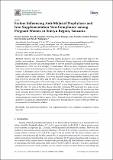| dc.contributor.author | Sambili, Benatus | |
| dc.contributor.author | Kimambo, Ronald | |
| dc.contributor.author | Peng, Yun | |
| dc.contributor.author | Ishunga, Elison | |
| dc.contributor.author | Matasha, Edna | |
| dc.contributor.author | Matumu, Godfrey | |
| dc.contributor.author | Noronha, Rita | |
| dc.contributor.author | Ngilangwa, David P. | |
| dc.date.accessioned | 2022-08-20T09:30:52Z | |
| dc.date.available | 2022-08-20T09:30:52Z | |
| dc.date.issued | 2016-06-23 | |
| dc.identifier.citation | Sambili, B., Kimambo, R., Peng, Y., Ishunga, E., Matasha, E., Matumu, G., Noronha, R., & Ngilangwa, D. P. (2016). Factors Influencing Anti-Malarial Prophylaxis and Iron Supplementation Non-Compliance among Pregnant Women in Simiyu Region, Tanzania. International journal of environmental research and public health, 13(7), 626. https://doi.org/10.3390/ijerph13070626 | en_US |
| dc.identifier.other | DOI: 10.3390/ijerph13070626 | |
| dc.identifier.other | PMID: 27347981 | |
| dc.identifier.other | PMCID: PMC4962167 | |
| dc.identifier.uri | https://repository.amref.ac.ke/handle/123456789/778 | |
| dc.description.abstract | Malaria and iron-deficient anemia during pregnancy pose considerable risks for the mother and newborn. Intermittent Preventive Treatment during pregnancy with sulphadoxine-pyrimethamine (IPTp-SP) and iron supplement to prevent anemia to all pregnant women receiving antenatal care (ANC) services is highly recommended. However, their compliance remains low. This study aimed at identifying factors influencing non-compliance of medications among pregnant women. A descriptive cross-sectional study was conducted in Simiyu region in northwest Tanzania using a structured questionnaire to collect data from 430 women who were pregnant or gave birth 12 months prior to data collection. Data were analyzed using non-parametric statistical analysis with STATA 10. Overall, 284 (66%) and 195 (45%) of interviewed women received IPTp-SP and iron supplementation during their ANC visits, respectively. The majority (85%) of women whom received medications were aware if they had received IPTp-SP or iron supplementation. Of those received IPTp-SP, only 11% took all the three doses, while the remaining 89% took only two doses or one dose. For women who received iron supplementation, 29% reported that they did not take any dose at all. Reasons given for not complying with regiments included not liking the medications and disapproval from male partners. Our findings suggest that IPTp-SP and iron supplement compliance among pregnant women in Simiyu region is low. Intensification of community education, further qualitative research and administration of medication through directly-observed therapy (DOT) are recommended to address the problem. | en_US |
| dc.description.sponsorship | Government of Canada through its Department of Foreign Affairs Trade and Development (DFATD),formerly CIDA | en_US |
| dc.language.iso | en | en_US |
| dc.publisher | MDPI | en_US |
| dc.subject | Tanzania | en_US |
| dc.subject | Anti-malarial prophylaxis | en_US |
| dc.subject | Iron supplementation | en_US |
| dc.subject | Non-compliance | en_US |
| dc.subject | Pregnant women. | en_US |
| dc.title | Factors Influencing Anti-Malarial Prophylaxis and Iron Supplementation Non-Compliance among Pregnant Women in Simiyu Region, Tanzania | en_US |
| dc.type | Article, Journal | en_US |

